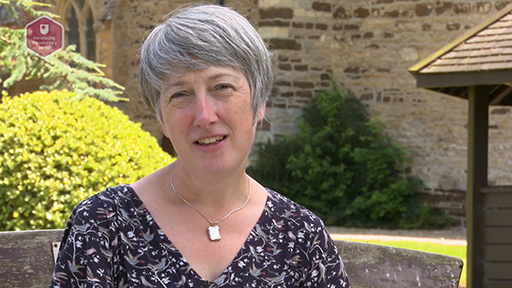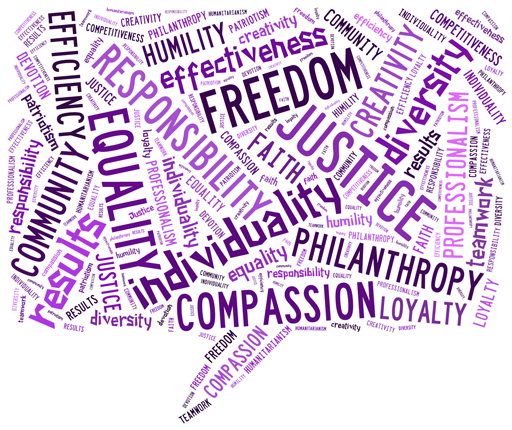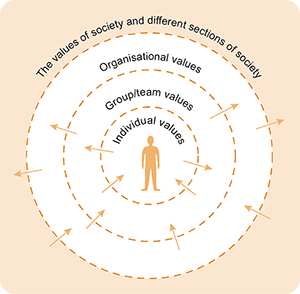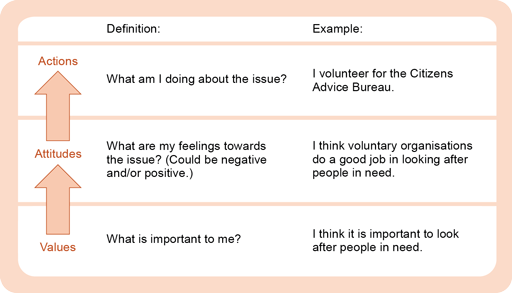Week 2: Values and beliefs
Use 'Print preview' to check the number of pages and printer settings.
Print functionality varies between browsers.
Printable page generated Saturday, 24 January 2026, 4:55 AM
Week 2: Values and beliefs
Introduction
On a day-to-day basis, you are undoubtedly affected by the values of other people. You probably find that there are both differences and similarities among your values and those of your friends, colleagues and your organisation (if you work or volunteer).
Last week you explored the nature and history of the voluntary sector and how it differs from the public and private sectors. You were also introduced to the idea that the voluntary sector is considered to have ‘distinctive’ value. One aspect of this was that voluntary organisations, although diverse in terms of size and purpose, are perceived to hold distinctive sets of
In the following video Julie Charlesworth introduces Week 2.

Transcript
This week you will explore values and beliefs and their importance to voluntary and community organisations, as well as how personal values might underpin your work or volunteering, and the ways in which you relate to others. The concept of values may seem rather abstract or hard to pin down. In order to understand them better, you will get some experience in thinking what your own values might be.
This week will also demonstrate that values exert a strong influence on people’s behaviour and motivation, particularly in choosing to work in the voluntary sector. Values are considered to be at the heart of this sector and guide what voluntary organisations do; for example, protecting vulnerable people in society, helping people deal with poverty and inequalities, or campaigning to save wildlife or to protect the environment. Other organisations may be set up as an expression of religious, humanitarian or political beliefs.
Furthermore, this week introduces the role played by organisational values in people’s work or volunteering. This week also looks at how differences in values can, on occasion, lead to conflict.
By the end of this week, you should be able to:
- explain what is meant by values
- understand the different levels at which values are perceived to operate
- reflect on the importance of values in how you relate to others
- explain how value conflicts arise.
1 What are values?
You will start by exploring what is meant by values and beliefs and why they matter in the context of the voluntary sector. You saw in Week 1 how the word ‘value’ is associated in different ways with the voluntary sector and, although in this week you will focus on one particular meaning, it is useful to recap on how ‘value’ has been used so far as well as introduce some new meanings. These new meanings will be explored further in future weeks of the course.
The following list covers some of the points and questions you were introduced to last week in terms of how ‘value’ has been applied to the voluntary sector.
- Distinctive value: this relates to whether there is something special about the voluntary sector and why organisations might seek evidence to prove it. This was discussed by Macmillan as a way of demonstrating advantage over competitors.
- Monetary value: this relates to income and funding, and assessing the financial contribution of the voluntary sector (you will find out more about this in Weeks 3 and 4).
- Value for money: this relates to whether services provided are efficient and effective. This is usually part of contracts between voluntary organisations and other organisations.
- Social value: this relates to the ‘added value’ of organisations beyond financial considerations, such as wider benefits to local communities or environmental concerns, and is now part of contracts with government.
There are two further aspects of value that you will find out more about this week and next week:
- Valuing the contribution of volunteers: this can have two meanings. First, organisations appreciate the work and contribution of their volunteers. Many cannot function without the help of volunteers. The second meaning relates to putting a monetary value on the contribution of volunteers. This is often done by working out what the total cost of salaries would be if the volunteers were paid members of staff.
- The values of staff, volunteers and organisations in the voluntary sector: What values do people and organisations hold? Can we generalise about values?
1.1 Defining values
Definitions of values are rather complex. Generally speaking, values are deep-seated beliefs about what is right or wrong and about what is important or unimportant. They are principles, standards or qualities that people care about and that contribute to driving people’s behaviour. Values held by individuals are also supported by a set of unwritten rules or norms about what is socially acceptable behaviour – both personally and within society.
Values incorporate a degree of judgement, and this further implies that people’s values are based on what is important as well as how important it is to them. Therefore, once people have ‘internalised’ a set of values, it becomes a standard for understanding the world around them, directing and justifying their own actions, sustaining their attitudes and, inevitably, judging others’ actions. Values can be abstract, such as freedom of choice, or specific, relating to, for example, hunger, poverty or racism.

A word cloud made up of the following words: justice, freedom, equality, individuality, compassion, results, responsibility, diversity, philanthropy, community, efficiency, effectiveness, creativity, patriotism, loyalty, humility, faith, competitiveness, professionalism, devotion, teamwork, humanitarianism.
Activity 1 Thinking about values
Figure 1 shows some examples of values. Identify the values you think you uphold, as well as those that go against what you believe in. Can you also identify any values that clash or contradict?
Comment
Everyone will have a different answer to this activity due to the nature of values. You may find that you share similar values with your friends or colleagues: values are one aspect of which job we choose, where we work and the people we enjoy spending time with.
In terms of work, if you find smoking unacceptable, you might choose not to work for a tobacco company; if you are passionate about animals, you might choose not to work for a company that tests their products on animals. However, not everyone has a choice in where they work. You will have the opportunity to do more thinking about your personal values in Section 2.
1.2 Different levels of values
Values do not operate just at a personal level but across other levels too: groups, organisations, even societies. These levels are all considered to have sets of shared values, which exert influence across the levels in different ways. The levels are depicted in Figure 2 and include:
- personal
- groups (or teams in the context of work)
- organisational or sectoral (public, private, voluntary)
- societal.

This figure shows three overlapping circles with arrows going in and out across the circles. In the central circle is a person and the circle is labelled individual values. Moving outwards, the next circle is labelled group/team values, and the outer circle is labelled organisational values. The area outside the circles is labelled the values of society and different sections of society.
As suggested by the arrows in Figure 2, influence can be both downwards and upwards. For example, this means that individuals vary in the extent to which they support and adopt – and therefore internalise – societal values. In addition, individuals may be able to influence and change the way their organisation acts, while organisations can exert influence on the teams and individuals working within them. Groups may bring about change at a societal level, thereby influencing the set of shared values.
Researchers are often interested in particular interactions; for example, how personal values interact with groups in society (gang culture, different ethnic or religious groups, or clashes between groups). Research focusing on organisations or management would have a particular interest in whether there are shared values in teams and organisations, and where conflict might occur. Teams are important in many contexts: volunteers are often based in teams and need to work together to achieve tasks. Having an
The World Values Survey (n.d.) measures changes in people’s beliefs, values and motivations at a country level. Therefore, it is possible to take research on individual values, collate them and examine whether there are shared values at a societal level and how these might change over time. In research on the voluntary sector, people’s motivations to volunteer are often examined through their values.
You will explore these different levels starting with personal values and moving out to organisational and sectoral values. The societal level is beyond the scope of this course but, if you have time at the end of the week, you could visit the World Values Survey website.
2 Personal values
You will now explore personal values and how these have an impact on your interest in, and choice of, particular types of work and organisation. You will also examine how you work or volunteer, and how you interact with other people who may or may not share your values. Values are just one component in people’s behaviour and actions: motivation, abilities, education and temperament also play a part (and are also wider components of an individual’s personality).
Personal values stem from our social background, religion (if we have one), ethnic origin, culture, upbringing, education and our experiences of life and work. Personal values are not static. They continue to evolve during our lifetime as we experience new situations and people’s behaviours, particularly ones involving conflict or difference, or ones we find surprising or offensive. These encounters provide opportunities to question and rethink our own values. Of course, people may not be fully conscious of the values they hold or of the value judgements they are making when taking particular actions. People are also not necessarily consistent in their behaviour, and there may be a discrepancy between what we say our values are and how we act.
Activity 2 What is important to you?
Answer the questionnaire on personal values provided below. It is best to do this fairly quickly without thinking about the statements too much, but if you want to spend more time on it – perhaps because the concept of thinking about values still feels strange – then do so. There are no right or wrong answers to these questions – it is designed merely to get you to reflect on your own values and what you hold important. When you have finished the questionnaire, make sure you scroll the bottom of the screen to read our comments on this activity.
Comment
There may be as many values and beliefs as there are people in the world. This questionnaire, however, looked at the following set of values:
- being the best and helping others to achieve
- caring and having compassion for others
- caring for the environment
- doing what is right and proper
- equality
- faith and religious belief
- the importance of being part of a group
- the importance of being part of a community.
Based on your results, you might want to consider:
- how you might work alongside people whose values are quite different from your own
- how your values do or do not correspond with those of your organisation (if you are working)
- what happens when the values that you hold contradict each other
- how values impact on assumptions about, and understanding conflict.
Of course, in an ideal world, you might see all of these values as important, but the questionnaire forced you to make choices. As you work through the remainder of this section, you might want to continue reflecting on what your core values are. These may be quite different from those included in the questionnaire.
When you have to choose:
- What is most important?
- What will you compromise on?
- What is not open for discussion?
2.1 Values and behaviour
Your work on Activities 1 and 2 might have got you thinking about how values could influence your behaviour and actions in the following areas:
- where you work or volunteer
- who your friends are
- how you interact with others
- why you might have been in conflict with another person, your team or your manager (if you have one).
You can build on this by thinking about statements such as ‘I like volunteering for the local hospital’. This is considered to be an ‘attitude’ rather than a value and stems from a desire to do some social good. Other factors may also influence actions: in this example, choosing to volunteer may also be about filling spare time or gaining useful skills for obtaining paid work. Therefore, theorists argue that values are the bedrock for attitudes, which guide people’s actions (see Figure 3). A caveat to this statement is that people do not always act in a rational way: human nature can be inconsistent and contradictory.

This figure has three columns and three rows. From left to right, the first column shows two upward pointing arrows and the rows (reading from the bottom upwards) are labelled values, attitudes and actions. The next two columns are labelled definition and example. The bottom row of values, under definition, says ‘What is important to me?’; then under example, it says ‘I think it is important to look after people in need’. The next row up of attitudes, under definition, says ‘What are my feelings towards the issue? (Could be negative and/or positive.)’ and under example says ‘I think voluntary organisations do a good job in looking after people in need’. The top row of actions, under definition says ‘What am I doing about the issue?’ and under example says ‘I volunteer for the Citizens Advice Bureau’.
Thinking about how values and attitudes influence or drive your behaviour can be important in a work context. Imagine you are asked to carry out a task that does not fit with your values. Would this result in conflict?
For some people in the workplace, there is such a mismatch between their own individual values and what they are asked to do (or something they have witnessed), that they are driven to the practice of ‘whistle-blowing’. This means reporting an organisation to the media. There have been many high-profile examples of this in the health service (poor care, abuse and neglect in Mid-Staffordshire NHS Foundation Trust) and in technological scandals (Julian Assange and Edward Snowden). Legislation now exists in many countries to protect whistle-blowers and in the UK a charity, Public Concern at Work, provides support.
Activity 3 Values and actions
Using your work on the questionnaire in Activity 2, choose one of the value statements that was particularly important to you. Use the statement to write out your own version of Figure 3. It could be based on something you have already taken action on or something you would like to act on in the future.
Comment
Did you find this activity difficult or straightforward? Sometimes it is difficult to take what might appear to be fairly ‘abstract’ or general statements and translate them into actions. If you are thinking about volunteering or working in a voluntary or community organisation, you could also use this activity for career planning.
2.2 Challenges
Individual values fit broadly into two types:
- those that are about means – how you think things should be done
- those that are about ends or goals – what you would like to achieve.
Values about means include working hard and being honest, open-minded and forgiving. Values about ends include achieving happiness, prosperity and accomplishments, and treating people with respect.
Being more aware of your own values can help you to understand why you are doing things and whether your own actions are consistent with your values. It can also help you to appreciate the values that others hold and the influence those values have on their behaviour. If you can recognise the differences and tensions that arise from value conflicts, you are more likely to be able to help to resolve them. If you challenge another person’s values, you may appear to them to be challenging very personal issues – even the other person’s identity – so do not be surprised if they react strongly.
People often feel compelled to express values in public, perhaps by speaking out against an issue, group or person, to protest against injustice and behaviour they perceive to be morally wrong. However, many people do not make big statements about their values. Other people use their volunteering or work to express values or as a basis for which causes they choose to support: they may hear about disasters in the news and feel compelled to donate money – which can be immediate through text donations. Others support charities and causes on a regular basis.
As an individual working or volunteering, you may need to consider how values translate into assumptions and even prejudices. It is difficult to identify our own prejudices because they are often associated with assumptions that are central to our sense of personal security. When our assumptions are challenged, we feel uncomfortable and have to deal with our feelings as well as with the issues that have been raised. It is helpful to develop the ability to listen and to suspend judgement for a while, even to take time to check out an issue with a colleague if it is outside your experience.
The next section develops the work context by examining values at an organisational level.
3 Organisational values and vision
This section builds on your work on understanding personal values and how they work with those of organisations. Two main areas are discussed:
- What are organisational values?
- Why might conflict arise?

A collection of post-it notes representing shared organisational values. There is one post-it note in the middle, which says shared values. The other notes are arranged in a circle around it. Reading clockwise from the top, the post-it notes say: staff; strategy; systems; structure; style; skills.
Much has been written about how values contribute to
Organisational values may be similar to the types of personal values you have explored so far this week such as helping others, showing compassion, making a difference and so on. They are usually expressed in a more collaborative way, i.e. ‘we believe’ or ‘our objective is to …’ and so on. Just as personal values are the set of beliefs and principles guiding people’s behaviour, this also applies to organisations and how they work in practice.
Values (in theory) guide organisations’ activities, services offered, recruitment and management policies. Sometimes an organisation’s values might be expressed as more ‘aspirational’ – this is what we want to achieve but we might not be there yet. Forrest et al. (2012, p. 1) at Cass Business School in London conducted a large-scale survey and detailed
- collaborate
- respect
- compassionate
- excellence
- professional
- creative.
The next activity illustrates how personal values might link with those of organisations.
Activity 4 Do you love your job?
Watch these two films showing people who work in the Scottish voluntary sector talking about what they love about their jobs. Make notes on what they say about their personal values and those of the organisations they work for.
Comment
Both Gillian and Elliott seem to express their answers in terms of values – personal values (justice, make a better place) – which suggests these are important and at the forefront of their minds in terms of their work. In terms of their organisations, they refer to the staff being dedicated, enthusiastic and working to the same mission and values.
If you were asked ‘why do you love your job (or volunteering)?’ what would you say, and would you answer in terms of values?
3.1 Communicating values
How do organisations communicate their shared values in a statement that its staff, volunteers and other stakeholders can understand and relate to? The most common approach is through its mission statement, website, social media such as Twitter and Facebook, advertisements for recruiting staff and volunteers, and in fundraising campaigns. Statements of values explain to staff, stakeholders and the public what the purpose of the organisation is and what it stands for or what it feels is important.
The following extract highlights how all organisations (not just those in the voluntary sector) regard statements of values as important.
Box 1 Values-led businesses
Beyond pursuing success and profitability, organisations realised some time ago that their stakeholders needed them to be able to say: ‘This is how we do things here.’
It is hard now to find an organisation of any shape or size, from small NGOs to large corporates, which doesn’t publicly list its values, often quite prominently. Greenpeace International, for example, lists its values as: personal responsibility and nonviolence, independence, having no permanent friends or foes and promoting solutions. While Coca-Cola claims to be motivated by values of leadership, passion, integrity, accountability, collaboration, innovation and quality.
Similar lists can be found on the websites of virtually all organisations. The challenge is establishing what they mean and how stakeholders can ensure they are being lived and embodied, not just espoused.
Activity 5 Mission statements
Here is a mission statement from Wales Council for Voluntary Action.
Our vision
A Wales where everyone is inspired to work together to improve their lives, their communities and their environment.
Our mission
We will provide excellent support, leadership and an influential voice for the third sector and volunteering in Wales.
Our values
We believe a strong and active third sector builds resilient, cohesive and inclusive communities, gives people a stake in their future through their own actions and services, creates a strong, healthy and fair society and demonstrates the value of volunteering and community involvement.
We are determined to demonstrate …
- Diversity – being accessible to all
- Fairness – being open and consistent
- Integrity – being honest, and upholding the independence of the third sector
- Accountability – being ethical, responsible and responsive
- Partnership – working with all those who help to achieve our vision
- Sustainability – making a positive impact on people, communities and the planet
Using the list below, make notes on how well the Wales Council for Voluntary Action addresses the requirements to make its purpose and values clear:
- who the organisation is
- what it does
- what it stands for
- how it will achieve its purpose.
Comment
There is quite a lot here about the values of the Wales Council for Voluntary Action and they give a strong sense of the Council’s purpose and ambition. What is often difficult in a mission statement is to give specific detail about how to achieve the organisation’s purpose.
In the next activity you will think about the values of your own organisation (if you are working or volunteering) or one that interests you.
Activity 6 Exploring organisational values
Write down what you think are the most important values that underlie the work of your organisation. If you are not already working or volunteering, choose an organisation that you would like to work for and use their main website or what they put on social media sites to find the information about their values.
Has there been or can you foresee any conflicts that might arise between these different values?
Comment
Your response to this task will reflect not only your own observations about your organisation and your colleagues but also your own values and attitudes. It might also have helped you to think about issues and values you had perhaps taken for granted. You may have struggled to find the information you need. Perhaps if you work in (or chose) a small organisation, nothing is written down formally. This might have led you to think about whether that is appropriate and whether it affects staff/volunteer motivation or could impact on fundraising or seeking contracts.
3.2 Conflicting values
Activity 6 introduced the idea that there may often be a mismatch between organisations’ published values and how those values are demonstrated in reality. The research by Cass Business School set out to examine whether organisations ‘practise what they preach and how they best use values’ (Forrest et al., 2012, p. 1). One of their case studies showed how one organisation realised that as they had grown from two people working in a church hall to a bigger contracting organisation, internal conflict arose over values and objectives. Key points extracted from the case study are shown in Box 2.
Box 2 A values journey
Murray Hall Community Trust, West Midlands
The organisation grew strongly and quickly – the tipping point was when they became a contracting organisation – and so needed systems in place […] This shift created internal tension – are we a charity or a company?
They went back to basics to examine values and if they’d changed and if so, how?
They consulted staff on this and ensured they were brought along. They addressed the whole of the organisation and their hearts and minds.
[…]
Because they have investigated the tension between business and charity ‘pulls’ the values exercise has reminded them about what’s the right decision for them. The values offer a compass to help decide what they want to do in terms of the work they pick up and do.
[…]
In interviews, job candidates are asked how their values interplay with those of the organisation.
This case study illustrates how the organisation realised that their original values were being affected by becoming a contracting organisation. However, by acknowledging this as a problem and then working on it with their stakeholders, it seems the organisation prevented the situation from getting worse. In fact, the work on revisiting values gave them a stronger focus on being value-driven.
If you are seeking work in a voluntary organisation, it would be important to check before an interview what the values of the organisation are. As this case study shows, you might be asked questions about them at interview.
The next activity guides you in thinking further about where conflict might arise.
Activity 7 Conflict at the charity shop
Mary Portas, a retail guru based in the UK, worked with charity shops for a television series where she tried to change the shops’ image. She put up prices for some items and also refitted a shop to improve how it looked.
Watch the short clip and make notes on the concerns expressed by the volunteers and Mary Portas. How do they express their concerns in terms of values?
Comment
A volunteer had left because of concerns that the charity shop was changing and moving away from its core value or purpose of raising as much money as possible for the charity. The volunteers could not understand why money would be spent on refitting the shop and employing a paid manager rather than given to those in need. Mary Portas was attempting to apply her ideas from the private sector to a charity shop and that investing in improving the shop’s appearance would bring in more business. The volunteers give their time for free and perhaps feel their values and contribution are less appreciated.
Fear of change is a difficult issue in all organisations and needs careful management with volunteers. When people are not paid members of staff, they can make snap decisions to leave.
Many people will have examples of conflict from their organisation but we may not always think about how values form an important part of it. Thus, on a day-to-day level, the challenge for people with management or supervisory responsibilities is to try to interpret and understand the different values of their organisation and the people they work with, so that they can cope better with the conflicts that may arise. It is worth exploring with new members of staff and volunteers their perceptions of the organisation’s value and purpose. In this way, important value differences can be addressed sooner rather than later.
4 Values in the voluntary sector
Having examined organisational values and how personal values fit with organisations, you will now focus on whether it is possible to identify shared values in the voluntary sector as a whole. This week started by stating that values were at the heart of the sector, but what does that mean given the diversity of organisations within the sector? Many discussions among researchers and voluntary sector practitioners about what is unique or different about the voluntary sector highlight that it is perceived to be value-driven, with staff, volunteers, founders, board members and other stakeholders sharing a set of core values.

From working on the activities this week with your own values, you might have started thinking about the values that could be considered common to the voluntary sector as a whole; for example, honesty, participation, democracy, fairness, justice, accountability, equality, equity, compassion, freedom, empowerment, rights, solidarity, dignity, integrity, respect, trust, citizenship and tolerance.
The National Council for Voluntary Organisations (NCVO) lists what it regards as the shared values for the voluntary sector:
- a belief in collective action
- social justice and making a positive difference to people’s lives
- taking a holistic approach to people’s needs
- empowering people and making voices heard
- building social capital and reinvesting financial surpluses for community need.
Having a focus on a sector as a whole inevitably involves making some general assertions. Not all these values would apply to all the organisations within the sector but it gives a sense of the main purpose or direction for organisations considered to be part of this sector. Furthermore, having a set of shared values for the sector is perceived to give it an advantage over other sectors, which might be useful in bids for funding and contracts. It also builds an identity and set of goals that organisations, large or small, can share. The NCVO, however, is concerned that the voluntary sector’s values and independence are threatened if it works too closely with government.
Activity 8 Values under threat
Read through this list (identified by NCVO) of possible threats to voluntary sector values. In the box below are values that may be threatened. Against each value, type the number of the threat you think corresponds to it. There will be different interpretations on allocating these but think about which ones seem to fit the best and which you are most concerned about. You can use each threat more than once and you can allocate more than one threat to each value.
Threats
- the ‘top-down’ nature of the relationship between government and the voluntary sector
- funders preventing legitimate campaigning, lobbying and advocacy either directly or implicitly
- funders influencing the activity and direction of voluntary organisations
- voluntary organisations relying too heavily on one source of funding or contract
- perceived pressures to become more like a business, rather than more business-like.
Comment
| Value | Threat |
|---|---|
| A belief in collective action | 2, 3 |
| Social justice and making a positive difference to people’s lives | 2 |
| Taking a holistic approach to people’s needs | 4, 5 |
| Empowering people and making voices heard | 1, 5 |
| Building social capital and reinvesting financial surpluses for community need | 5 |
We have suggested some answers but all the threats are equally important and could affect all the values. The part of the voluntary sector in which you work or volunteer, or have an interest in, may have influenced how you perceived the threats: some organisations are very dependent on government contracts and may feel restricted in activities beyond meeting the terms of the contract.
5 This week’s quiz
The end-of-week quiz gives you the opportunity to check your understanding and progress. Again, it consists of five questions and will help you to prepare for the longer Week 4 badge quiz.
Open the quiz in a new tab or window (by holding ctrl [or cmd on a Mac] when you click the link).
6 Summary
This week you have explored different aspects of values and the different levels (personal, organisational, voluntary sector) at which they operate in the context of voluntary organisations and your work, volunteering or general interest. You have learned that the concept of values is not straightforward and that values play a role in how organisations manage their activities and communicate their purpose to staff, volunteers, beneficiaries, other stakeholders, funders and the public. The idea of a value-driven sector was examined this week by looking at shared values and also the threats to those values. Furthermore, the activities this week should have helped you to reflect on what is important to you and how this relates to your work or volunteering with voluntary or community organisations.
In Week 2, you have learned about:
- how the concept of value has been applied to the voluntary sector
- what values are
- the different levels at which values operate and how they interact
- how to reflect on your own individual values and how they relate to behaviour
- what organisational values are
- how organisational values are communicated
- how conflict over values can arise
- what the values of the voluntary sector are and how they are under threat.
Next week you will explore data about the contribution of the voluntary sector and also learn about some differences within the sector.
You can now go to Week 3.
References
Acknowledgements
Acknowledgements
This course was written by Julie Charlesworth.
Except for third party materials and otherwise stated in the acknowledgements section, this content is made available under a Creative Commons Attribution-NonCommercial-ShareAlike 4.0 Licence.
The material acknowledged below is Proprietary and used under licence (not subject to Creative Commons Licence). For the avoidance of doubt: All third party videos credited below, and those which link you to Youtube for viewing, are not subject to Creative Commons licensing. Grateful acknowledgement is made to the following sources for permission to reproduce material in this course:
Course image: © Katie Hetrick in Flickr https://creativecommons.org/ licenses/ by/ 2.0/.
Figure 4: Marekuliasz/iStockphoto.com.
Figure 5: Steve Debenport/iStockphoto.com.
Every effort has been made to contact copyright owners. If any have been inadvertently overlooked, the publishers will be pleased to make the necessary arrangements at the first opportunity.
Don’t miss out:
1. Join over 200,000 students, currently studying with The Open University – http://www.open.ac.uk/ choose/ ou/ open-content
2. Enjoyed this? Find out more about this topic or browse all our free course materials on OpenLearn – http://www.open.edu/ openlearn/
3. Outside the UK? We have students in over a hundred countries studying online qualifications – http://www.openuniversity.edu/ – including an MBA at our triple accredited Business School.
Copyright © 2015, The Open University.